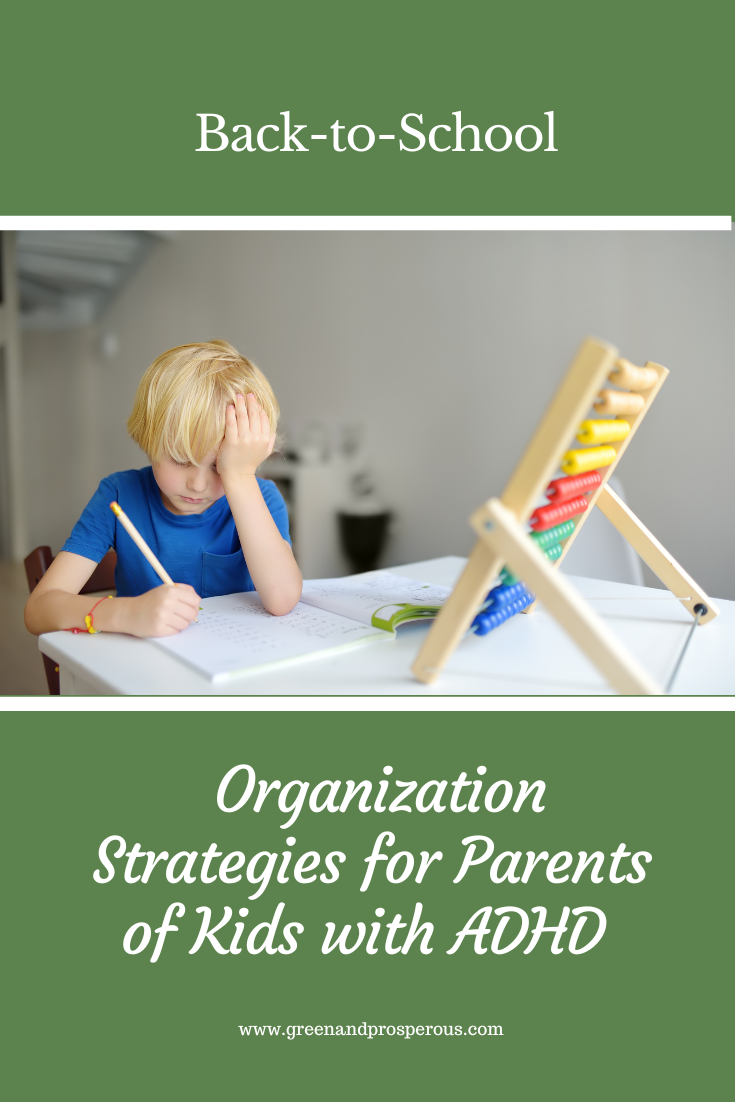Back-to-School Organization Strategies for Parents of Kids with ADHD
/Now that the school year is well underway and the holiday season is approaching, are you feeling the pressure to get your ADHD child organized and on track? Has the chaos of homework, deadlines, and extracurriculars already led to frustration for both you and your child?
For parents of children with ADHD, getting through the school season can feel like navigating a minefield of schedules, assignments, and emotional ups and downs. With unique challenges in staying organized and focused, children with ADHD often need a bit of extra help to thrive. The transition back to school after an extended holiday can be daunting, leaving parents searching for solutions that work without too much hassle or time spent figuring them out.
Fortunately, a few clever organization strategies can help you create a structured, predictable environment for your child. By implementing some simple yet effective strategies, you can foster independence and turn chaos into calm, helping your child embrace the school year with confidence. In this article, we'll explore some essential organization hacks tailored specifically for parents of children with ADHD, ensuring that you and your child can tackle the school year with greater ease and less stress.
Communicate with your child's teacher(s)
Take the time to initiate communication with your child's teacher early in the school year. If you've already had parent-teacher conferences, you may have a good idea of where your child's strengths and weaknesses in the classroom lie. Keep the lines of communication open and don't let that conference be the first and last time you communicate with your child's teacher all year.
Building a positive relationship with educators can provide invaluable insight into your child's ongoing performance and behavior in the classroom. Schedule regular brief check-ins, whether through emails or face-to-face meetings, to discuss any academic challenges or social concerns. This proactive approach allows you to collaborate on strategies that can help reinforce learning at home and ensure consistency between home and school.
Teach your child a listening trick
Teaching children effective listening skills is crucial to their academic success and overall development into adulthood. One powerful technique you can use right now is to encourage them to internally repeat important information as it is being communicated. This method resembles a silent game of "Copycat," where they actively engage with the content by mentally echoing the words spoken by their teacher or anyone giving vital instructions. As they absorb what is being said, this internal repetition not only helps consolidate the information in their memory but also provides a structured way to remain focused on the task at hand. By nurturing this habit, children can significantly enhance their capacity to listen attentively and retain crucial details.
Moreover, implementing this listening trick can prevent distractions from derailing a child’s concentration during important discussions or lessons. By silently reiterating every word shared by the teacher, they maintain an active connection to the material being presented rather than allowing their thoughts to wander aimlessly. This practice cultivates a sense of discipline and mindfulness, as it teaches children that paying attention requires deliberate effort and engagement. Overall, by mastering this technique early on, your child can develop stronger listening skills that will serve them well throughout their educational journey and beyond.
Homework Tips for Disorganized Kids
When it comes to helping your disorganized child navigate the challenges of homework, it's crucial to approach the situation with an ample dose of patience and understanding. Anger and frustration can cloud both your judgment and your child's ability to listen and learn. By removing these negative emotions from the equation, you create a supportive environment that fosters growth and encourages effective strategies for managing their schoolwork. This change in mindset not only benefits your relationship with your child but also paves the way for productive conversations about organization and responsibility. Viewing homework as a partnership rather than a source of conflict helps children feel more comfortable seeking help when needed. When you feel yourself start to get frustrated, take a breather (literally) to keep yourself from losing your temper: count to ten, breathe in deeply 5 times, or walk out of the room briefly to compose yourself.
A great starting point for fostering a sense of organization in your ADHD child is during back-to-school shopping, where parents can consciously select supplies that cater to their child's unique needs. Opting for items like color-coded folders, planners, or binders can make a significant difference in how your children manage their assignments. Encouraging them to take ownership of the process—like choosing their own organizational tools—instills a sense of responsibility and pride in their workspace. Additionally, discuss strategies like setting up a designated study space at home or implementing daily routines for homework completion. These foundational practices not only enhance their organizational skills but also empower them to take charge of their academic journey with greater confidence.
Create an Ideal Homework Station
Setting up a dedicated homework station can significantly enhance the focus and productivity of students, especially those with ADHD. In a chaotic environment, ADHD students will struggle to find a rhythm that works to keep them on track wiht their homework. A disorganized, messy, and chaotic atmosphere not only hampers concentration but also sends a message that schoolwork is secondary and unimportant. By creating a tidy and organized study area, parents can convey that education is valued and worthy of dedicated time and effort.
In addition to sending a positive message about your child's education, a personal workspace has profound psychological benefits. When kids have their own designated area for studying—complete with necessary materials clearly organized—they are more likely to take ownership of their assignments and view them as significant endeavors rather than annoying chores. This sense of responsibility can be transformative, especially for ADHD students who often struggle with motivation and organization. A well-established homework station not only assists in managing distractions but also promotes a feeling of accomplishment as children engage meaningfully with their tasks. Investing time into creating an effective homework environment -- one that reflects your child's personality and interests -- is one crucial step towards fostering independence and a positive attitude towards learning.
Use tools for time and task management
Office supplies can spark joy and creativity in children. For children with ADHD, office supplies can bring organization and structure to what might feel like chaos in their minds. By utilizing colorful tools like sticky notes, highlighters, gel pens, and stickers, parents can help transform daily activities—schedules, agendas, routines—into lively experiences that foster engagement rather than frustration.
To harness this potential fully for an ADHD child, you can create a corkboard timeline adorned with bright stickers or markers that depict monthly goals and milestones; not only does it provide visual stimulation but also serves as a dynamic reminder system. Personalized wall calendars filled with vivid imagery or thematic designs related to upcoming events can help maintain focus while allowing them to take ownership of their schedules. Similarly, introducing unique clocks or timers decorated in fun ways can help ADHD children manage their time more effectively. By setting visual limits on tasks—like a timer for study periods followed by short 10-15 minute breaks in which they can engage in a fun activity — children can better understand the concept of time management and develop healthier work habits.
Use visual reminders
For kids with ADHD, being able to see objects and information is crucial for memory retention and organization. When a note is jotted down but then tucked away in a drawer or buried under other papers, it often becomes forgotten — and essentially useless. Maintaining an organized system where notes remain visible or are easily retrievable at a later time is important for cultivating effective executive functioning skills. Writing down notes on paper can help reinforce memory, but if those notes aren't integrated into daily visual cues, they aren't going to be helpful. Keeping reminders front and center allows for repeated exposures that strengthen recall and ensure important tasks and responsibilities remain top-of-mind.
However, keeping important information visibile poses its own set of challenges. If every note or reminder is kept out in plain sight indefinitely, what began as a helpful strategy can quickly devolve into clutter. This accumulation can lead to mental fatigue as each additional piece of information creates a visually chaotic environment that detracts from productivity. Striking the right balance between maintaining necessary visibility and minimizing clutter requires thoughtful organization techniques such as categorization or rotation—a system where notes are displayed based on urgency or relevance at any given moment. Finding ways to keep critical information accessible while filtering out distractions is key to helping children with ADHD thrive.
Rest and brain food
Ensuring that children with ADHD, operate at their full potential requires a concerted focus on both rest and nutrition. Establishing early bedtimes is crucial; a child who receives a solid 8 hours of sleep is typically better equipped to manage the challenges of the day ahead. Quality rest promotes emotional regulation and cognitive functioning, which are essential for their academic performance and social interactions. The importance of a healthy breakfast cannot be overstated either; it serves as fuel for the brain and helps maintain steadier energy levels throughout the morning. Parents can lay the foundation for successful mornings by preparing nutritious meals that include whole grains, proteins, and fruits, setting their children up for success before they even leave home. Prepare some easy grab-and-go meals the night before: oatmeal balls with chocolate chips, bran muffins, or raw eggs that have been scrambled and spiced up so they are ready to fry in a pan the morning of school can make getting a nutritious meal easy, even if you are short on time.
Conclusion
Navigating the school season can be particularly challenging for parents of children with ADHD, but with the right organization strategies in place, it can also be an opportunity for growth and success. By communicating with your children's teachers throughout the school year, teaching your child listening skills so that they are better able to retain information, employing visual aids such as corkboard timelines, personalized calendars, and decorative timers, and sensuring that your child starts the school day with adequate rest and nutrition, parents can create an environment that fosters focus and accountability. In addition to these strategies, prioritizing visibility for important notes while minimizing clutter is essential to maintaining an organized and productive atmosphere. WHen you consistently implement these techniques, parents can help their children with ADHD stay on track and succeed academically while also nurturing their emotional well-being.
like this? please pin!
Although the back-to-school season may present unique challenges for parents of children with ADHD, it also offers a chance to implement effective organization hacks that cater specifically to their needs. By integrating these organization hacks into your daily routine, you can help your child develop essential skills for managing their time and responsibilities effectively.
Please feel free to share your organization strategies in the comments section below, especially if you have a child with ADHD. All comments containing links will be removed.
You may also be interested in…











































Now that the school year is well underway and the holiday season is approaching, are you feeling the pressure to get your ADHD child organized and on track? Has the chaos of homework, deadlines, and extracurriculars already led to frustration for both you and your child? Fortunately, a few clever organization strategies can help you create a structured, predictable environment for your child. In this article, we'll explore some essential organization hacks tailored specifically for parents of children with ADHD, ensuring that you and your child can tackle the school year with greater ease and less stress.